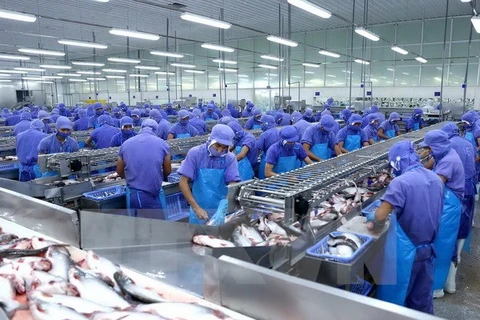HCM City (VNA) – The Middle East has recently been touted as a potential market for Vietnamese seafood exporters due to its rising demand for seafood products, high payment ability, and less strict product standards as compared to the EU, the US and Japan.
According to the Vietnam Association of Seafood Exporters and Producers (VASEP), the region has high demand for agricultural products as local natural conditions are unfavourable for agricultural production, especially seafood.
During 2007-2017, Vietnam earned average 300 million USD per year from exporting seafood to the market. Seafood is one of the five largest exports of Vietnam to the Middle East. Notably, tra fish has won consumers’ favour and gained foothold in the market.
Vietnamese exporters said that besides tra fish, Vietnamese canned tuna has ample opportunities in the Middle East. Currently, canned tuna is subject to an import tariff of five percent in most countries in the region, except for Libya, Tunisia and Turkey, which is much lower than the level in the US and the EU. Meanwhile, import duties are exempted for frozen tuna fillets.
Although Thailand is the main tuna supplier for the Middle East, the region is seeking other providers which offer lower prices like Indonesia, the Philippines and Vietnam.
As part of efforts to boost exports to the market, experts recommended domestic businesses gain deep understanding of the culture and society of Middle Eastern countries to develop products suitable for the market’s demands. Particularly, processed products must obtain Halal certification.
VASEP also drew exporters’ attention to branching out distributing channels, attending international seafood exhibitions, participating in trade promotion programmes and studying the market. At the same time, businesses are advised to be prepared for potential risks like political instability in the Middle East.-VNA
According to the Vietnam Association of Seafood Exporters and Producers (VASEP), the region has high demand for agricultural products as local natural conditions are unfavourable for agricultural production, especially seafood.
During 2007-2017, Vietnam earned average 300 million USD per year from exporting seafood to the market. Seafood is one of the five largest exports of Vietnam to the Middle East. Notably, tra fish has won consumers’ favour and gained foothold in the market.
Vietnamese exporters said that besides tra fish, Vietnamese canned tuna has ample opportunities in the Middle East. Currently, canned tuna is subject to an import tariff of five percent in most countries in the region, except for Libya, Tunisia and Turkey, which is much lower than the level in the US and the EU. Meanwhile, import duties are exempted for frozen tuna fillets.
Although Thailand is the main tuna supplier for the Middle East, the region is seeking other providers which offer lower prices like Indonesia, the Philippines and Vietnam.
As part of efforts to boost exports to the market, experts recommended domestic businesses gain deep understanding of the culture and society of Middle Eastern countries to develop products suitable for the market’s demands. Particularly, processed products must obtain Halal certification.
VASEP also drew exporters’ attention to branching out distributing channels, attending international seafood exhibitions, participating in trade promotion programmes and studying the market. At the same time, businesses are advised to be prepared for potential risks like political instability in the Middle East.-VNA
VNA

























